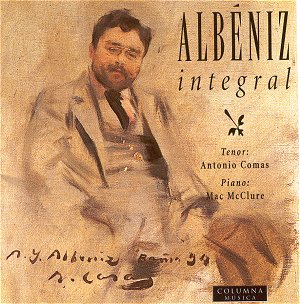


AVAILABILITY
D.I. Music (UK)
Tel: 0161 491 6655; Fax: 0161 491 6688
E-mail: dimus@aol.com
Isaac ALBENIZ (1860-1909)
Complete Songs:
‘Six intimate ballads’ (wds: Marquesa de Bolanos):
1) Barcarola
2) La lontananza
3) Una rosa in dono
4) Il tuo sguardo
5) Moriro!!!
6) T’ho riveduta in sogno
7) Art thy gone forever, Elaine (wds. F.B. Money-Coutts) Two fragments
of ‘prose texts’ by Pierre Loti:
8) Tristesse
9) Crepuscule
‘Four melodies’ (wds. F.W. Money-Coutts):
10) In sickness and health
11)
Paradise regained
12) The retreat
13) Amor, summa injuria
‘Poems by Gustavo Aldolfo Becquer’:
14) Besa el aura que gime blandamente…
15) Del salon en el angulo oscuro…
16) Me ha heido rectandose en la sombra…
17) Cuando sobre el pecho inclinas
18) De donde vengo? El mas horrible y
aspero…
Two surviving songs from the ‘Six songs’
(wds. F.W. Money-Coutts):
19) Separated
20)Will you be mine
‘To Nellie’ (wds. F.W. Money-Coutts):
21) Home
22) Counsel
23) May-Day song
24) To Nellie
25) A song of consolation
26) A song
27) Il en est de l’amour
(wds. Costa de Beauregard)
‘Two songs’ (wds. F.W. Money-Coutts):
28) The Caterpillar
29) The gifts
of the Gods
30) ‘Barberine’s song’ (wds. Alfred de Musset)
![]() Antonio Comas (tenor)
Antonio Comas (tenor)
Mac McClure (piano)
Recorded at the Teatro-Auditori, Centre Cultural, Sant Cugat
No specific recording dates given. Thought to be 1997. DDD
![]() COLUMNA MUSICA 1CM 0025
[71:39]
COLUMNA MUSICA 1CM 0025
[71:39]